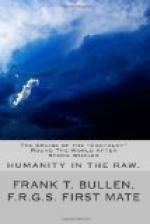The Maories have quite an original way of catching barracouta. They prepare a piece of “rimu” (red pine) about three inches long, by an inch broad, and a quarter of an inch thick. Through one end of this they drive an inch nail bent upwards, and filed to a sharp point. The other end is fastened to about a fathom of stout fishing-line, which is in turn secured to the end of a five-foot pole. Seated in a boat with sail set, they slip along until a school of barracouta is happened upon. Then the peak of the sail is dropped, so as to deaden the boat’s way, while the fishermen ply their poles with a sidelong sweep that threshes the bit of shining red through the water, making it irresistibly attractive to a struggling horde of ravenous fish. One by one, as swiftly as the rod can be wielded, the lithe forms drop off the barbless hook into the boat, till the vigorous arm can no longer respond to the will of the fisherman, or the vessel will hold no more.
Such were the goodly proportions of this first Solander whale of ours that, in spite of the serious loss of the case, we made thirteen and a half tuns of oil. When the fifteen huge casks containing it were stowed in their final positions, they made an imposing show, inspiring all of us with visions of soon being homeward bound. For the present we were, perforce, idle; for the wind had set in to blow steadily and strongly right up the Straits, preventing any attempts to get out while it lasted. The time did not hang heavy on our hands, for the surrounding country offered many attractions, which we were allowed to take full advantage of. Spearing eels and flounders at night by means of a cresset hung out over the boat’s bow, as she was slowly sculled up the long, shallow creeks, was a favourite form of amusement. Mr. Cross, the resident, kindly allowed us to raid his garden, where the ripe fruit was rotting by the bushel for want of consumers. We needed no pressing; for fruit, since we left Vau Vau, of any kind had not come in our way; besides, these were “homey”—currants, gooseberries, strawberries—delightful to see, smell, and taste. So it came to pass that we had a high old time, unmarred by a single regrettable incident, until, after an enforced detention of twenty days, we were able to get to sea again.
Halfway down the Straits we sighted the chance, all hands ripping the blubber off a sizeable whale in the same “anyhow” fashion as they handled their ship. They were in high glee, giving us a rousing cheer as we passed them on our westward course. Arriving on the ground, we found a goodly company of fine ships, which I could not help thinking too many for so small an area. During our absence, the Tamerlane had been joined by the Eliza Adams, the Matilda Sayer, the coral, and the rainbow; and it was evident that no whale venturing within the radius of the Solander in the daytime would stand much chance of escaping such a




